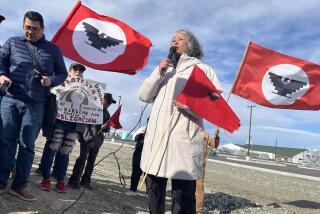AFL-CIO Should Shun Soviet Battle
Officials in Soviet President Mikhail S. Gorbachev’s government are fuming because the AFL-CIO is giving substantial help to the miners strike in the U.S.S.R.
The American unionists are aiding the Soviet miners openly, not covertly as they did for much of the 1980s when they provided crucial help to Lech Walesa’s union, Solidarity, which finally brought down Poland’s Communist government.
The U.S. labor federation’s impact on the turmoil now plaguing the Soviet Union is far less than it was on Poland, but it is stirring controversy.
The miners strike is having a devastating effect on the already battered Soviet economy and is a significant part of the effort to drive Gorbachev and his parliament out of office.
The AFL-CIO’s role in the strike, while very small, has been denounced in editorials carried both by Soviet government-run television and newspapers. The American unionists are being attacked for wrongly “interfering in internal Soviet affairs,” as an article in Tass, the state-controlled news agency put it.
But Dick Wilson of the AFL-CIO international affairs deparment says the federation is absolutely not trying to aid the massive campaign to force Gorbachev out of office, or even to help the Soviet miners achieve their specific economic demands.
“We have always supported the development of democratic trade unions free of government control everywhere in the world, and that’s what we are doing in the Soviet Union. What those unions do with their own organizations is their business, not that of the AFL-CIO,” Wilson says.
But it is hard for the American union leaders to avoid the appearance, if not the reality, of trying to help bring down Gorbachev.
Their motives may be pure--to help spread independent unionism everywhere--but the AFL-CIO should advise its new union friends in the Soviet Union not to press for Gorbachev’s resignation.
The miners should be urged not to overlook Gorbachev’s history-making leadership in overthrowing the tyranny of totalitarian Communist governments in East Europe and in making fundamental changes in his own country, including allowing the miners to have their own union and go on strike.
Several AFL-CIO leaders are uncomfortable about supporting a strike that has Gorbachev’s ouster as one of its goals.
John Banovic, secretary-treasurer of the AFL-CIO affiliate, the United Mine Workers of America, believes that goal of Soviet miners is wrong. Banovic, who has met several times with them, also agrees with top AFL-CIO officials that Americans cannot tell the Soviet miners what their strike demands must be.
Other AFL-CIO leaders agree with Banovic, but so far have not made their views public.
But Federation President Lane Kirkland recently sent a letter to Pavel Shushpanov, chairman of the executive committee of the striking Independent Trade Union of Miners, expressing “steadfast support . . . for the miners who are now engaged in a widening work stoppage.”
Besides the letter, the federation has supported the strike with gifts of computers, printers, fax machines and other supplies of the kind that helped Solidarity survive during the years it was outlawed by the Polish government. AFL-CIO representatives also have visited the striking miners to offer psychological encouragement.
Before the strike, Kirkland and other AFL-CIO representatives participated in an unprecedented program with Soviet miners under which delegations from both countries exchanged visits. The program was in itself a remarkable if small symbol of the vast changes brought about throughout the Communist world under Gorbachev’s leadership.
The AFL-CIO should urge its counterparts in the Soviet miners union to drop their demand for Gorbachev’s resignation.
A more productive approach, now in the planning stages, would create a coalition of U.S. coal industry management and union leaders to offer their advice on mining technology and labor-management relations. It is no small irony that such advice would be based in part on the Americans’ own often ugly labor-management history in the coal industry.
More to Read
Inside the business of entertainment
The Wide Shot brings you news, analysis and insights on everything from streaming wars to production — and what it all means for the future.
You may occasionally receive promotional content from the Los Angeles Times.










